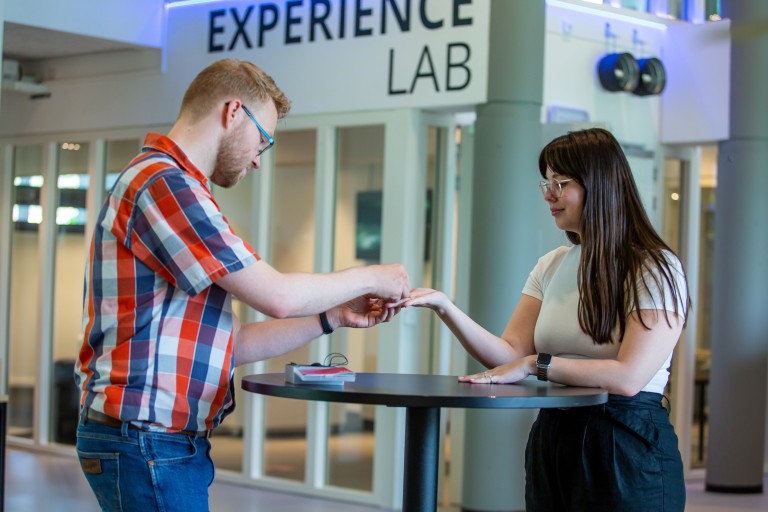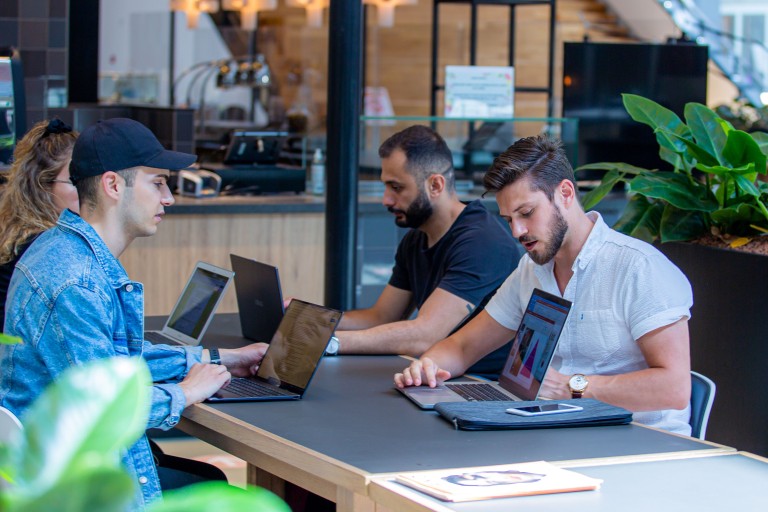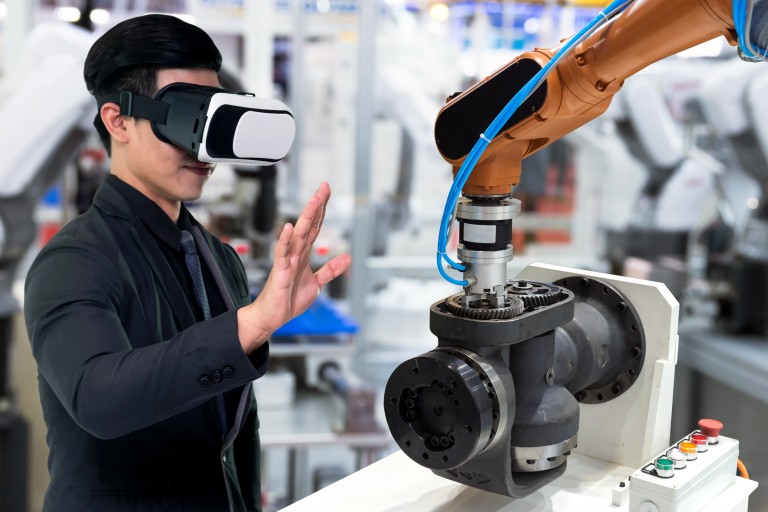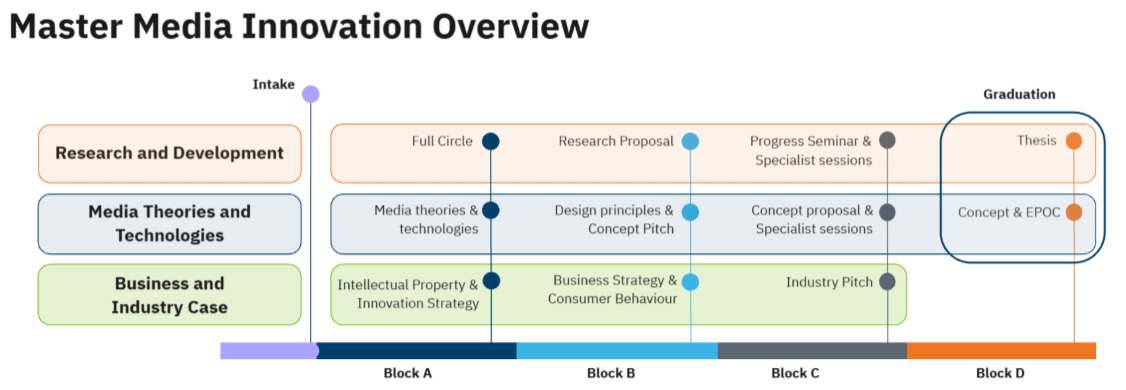Come and meet us
Walking around on campus is the best way to truly experience BUas. Sign up for one of the upcoming events or activities.
Study overview
Since its inception, the objective of the Executive Master Media Innovation has been to educate students who can develop insightful media-related research and innovative, market-oriented media products. In order to do this, students are exposed to a wide variety of topics including media theory, business models, emerging technologies, user-centred design, communication theory, and more.
- Focus
The Executive Master Media Innovation offers students a programme that trains them to systematically obtain the strategic skills necessary to be innovators. You will learn to look beyond the surface of digital media to reveal some very decisive core processes (ontologies), understand the way in which they function, and obtain the ability to apply these skills in creative innovative and future-orientated media products.
- International
The Master Media Innovation is a highly international programme; not only are a large percentage of our students and lecturers international, but students will also come into contact with international researchers and industry partners during the programme. The media industry is a global industry, and graduates of the Master Media Innovation are equipped to work in that industry.
The Executive Master Media Innovation is an international programme with lecturers from a number of academic and commercial disciplines in the field of digital media. The programme has a unique, multidisciplinary approach; training students to acquire analytical skills and to look beyond the surface of digital media, while encouraging them to apply those skills practically in innovative media concepts.
The programme lasts 12 months and consists of four blocks. Throughout the year, you will go through three learning paths to work towards your graduation project (15 ECTS credits). More information on these components can be found below:
- Research and Development
This module will improve your applied R&D skills on a master's level. You will deepen your skills in academic research in relation to industry, learning how to apply insights from research and theories on new (immersive) media innovations. After completing the module, you will be able to translate insights into well-defined problems and (research) questions, and convert findings into practical recommendations for media design and development while maintaining a critical perspective on research conducted within the media field.
Guided by lecturers with experience in both academic and industry R&D projects, you will apply the knowledge around three goals:
- to create and test innovative persuasive messages (ads)
- to develop the skills to effectively pitch ideas in both industry and academic contexts
- to prepare you for your graduation as well as support you in R&D around the other modules
In addition, you will have the opportunity to learn about, practice with, and make use of the facilities in our R&D labs, including the Experience Lab, VR Lab, and XR Stage, while participating in international R&D projects with real-world clients. This module also supports and offers opportunities to translate your work into academic or industry publications and keynote presentations.
Staff
- Prof. Dr Marnix van Gisbergen Professor Digital Media Concepts (XR Strategies)
- Dr. Shima Rezaei Rashnoodi Coordinator and senior Researcher (XR Architecture & Participatory Design)
- Dr. Fabio Campos Senior researcher & lecturer (XR Adoption & Predictive Modelling and Design)
- Dr. Miruna Doicaru Senior Researcher & lecturer (XR film & journalism flow and experience)
Example R&D clients & knowledge institutes
Banijay Benelux, DPG Media, Google, NPO, 4DR Studios, Queensland University of Technology, University of Oregon, Mindlabs, Griffith University, Universidade Federal de Pernambuco, Manchester Metropolitan University.- Media Theories and Concepts
The Media Theory and Technologies learning path firstly introduces students to (contemporary) Media Theory, an interdisciplinary field of study that focuses on the content, history and effects of different media. The interdisciplinary approach is reflected in the various theoretical perspectives and topics covered - including but not limited to - transmedia, ethics, game design and narratology.
Following this, students will be introduced to the topic of emerging (media) technologies, innovation, and design techniques, which culminates with students pitching an innovative media concept. The concept pitch is subsequently built upon as students are introduced to a range of methods for understanding and identifying user requirements; assessing technical feasibility, principles for creating a prototype user interface and interaction, as well as user testing, which leads to a written concept proposal that is an iteration of the initial concept pitch. This project concept will then be developed further as part of the Media Concept section of the graduation process.
The learning path assumes that students have no technical or programming knowledge and is therefore suitable for students from all fields of study. In addition, during the learning path, deep-dive sessions for specific technologies and concepts are offered, dependent upon student needs.
- Business and Industry Case
The Business and Industry Case learning path revolves around the knowledge, tools, and practical insights needed when dealing with topics such as intellectual property, strategy, innovation, entrepreneurship, and consumer behaviour. Besides general concepts and topics, the focus is on specific characteristics of the media and entertainment industry.
As a significant part of the course material has strategic content, the Master of Media Innovation also uses a case study from the media industry. Each year, a different client from the field is selected, and students work on a practical case. This gives students the chance to use and apply the theory they have learned in the programme to solve real, existing problems.
Each year, there is a unique case, but the core concept - using the theories and skills introduced to solve essential issues and propose conceptual solutions - remains a constant factor. The industry client is involved in both defining the problem statement of the case, providing formative feedback and assessing the students' final work. Previous clients have included Banijay, DPG Media, IBM, KLM, and Samsung.
- Graduation project
In the final part of the Master Media Innovation, students write a master's thesis on a theme of their choice, reflecting on the knowledge they have gained. This thesis, together with a research poster, is assessed by a panel and concluded with a defence. In addition, in the product-oriented graduation assignment, under supervision, they develop their own innovative media concept and a prototype of the innovative idea. These concepts are presented to lecturers and professionals during an industry day.
The programme lasts 12 months and consists of four blocks comprising a mix of primarily individual and a few group assignments, a practical assignment, and a graduation project. The graduation project consists of a thesis and an product-based graduation assignment.
For the full-time variant, there are two to three class days per week on the Breda campus; for the Executive it concerns two to three evenings per week online.
This master’s has a study load of approximately 40 hours per week.
The Executive Master Media Innovation is a one-year part-time programme with a total study load of 60 ECTS credits. Since 1 ECTS credit equals 28 hours of study, this means the programme requires an average study load of approximately 40 hours per week. Students can expect 4–6 contact hours per week, typically in the evenings and on occasional Saturdays.
We offer a small-scale study environment, as the number of students in this master’s programme is limited. The programme coordinator is always available to support you with day-to-day matters.
What makes this study programme unique
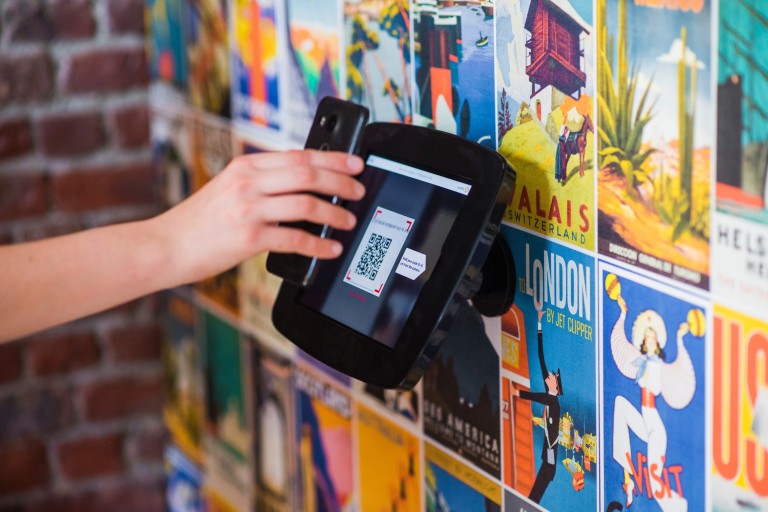
Industry Case
The Industry Case assignment gives you the chance to apply your MMI knowledge to impactful projects for high-profile clients like KLM, Samsung, Blue Circle, 4DR Studios, Banijay Productions, and others.
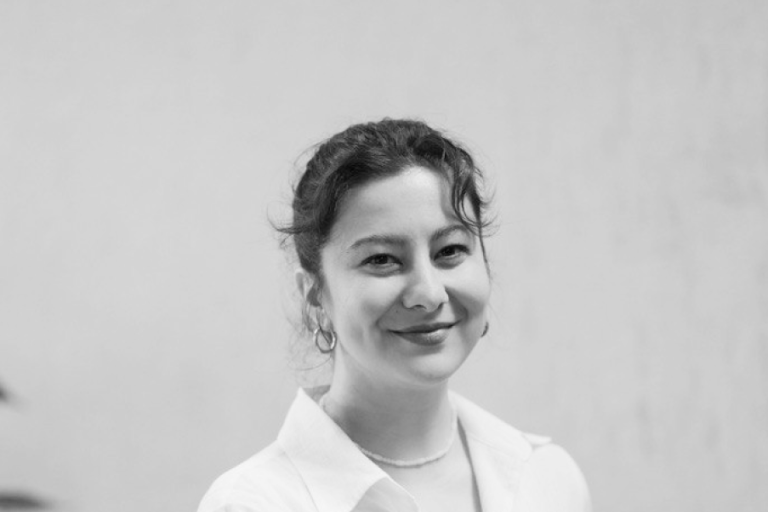
Lecturers with real-world expertise
Deniz Kurt is a lecturer in Media Technologies, focusing on emerging technologies, including AI. With two master’s degrees—one in Media and Culture Studies and another in AI and Creativity—she brings a diverse skill set to her teaching.
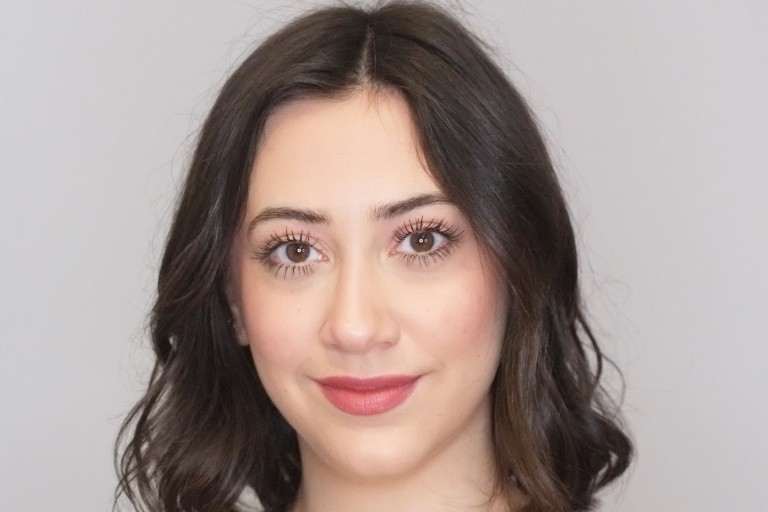
'Odor in VR': Laura Iannone wins edcom Graduation Competition
Her thesis, ‘Odor in VR. A qualitative study on the value of olfactory stimuli to enhance presence and empathy in the VR project Being There’, explored the integration of olfactory stimuli into a virtual museum created to support migrant women.
Admission & application
What are the admission requirements?
You are eligible if you hold a bachelor’s degree in the field of Business Administration, Media Studies, Communication Studies, IT, or another media-related field. Also three to five years (at least) of equivalent industry experience is required.
Information about admission requirements
What does this study programme cost?
In the academic year 2025-2026 the tuition fee for master's programmes is €2,601. In addition to the tuition fee, you will need to take into account additional costs for the purchase of study materials such as textbooks.
How can I apply?
If you meet the admission requirements, you can apply for this study programme. You can apply until 15 August, but you are encouraged to apply before 1 July because of the summer holidays. The executive programme will start with a minimum of six participants.
What others say about Media Innovation

The best fit for my passion and curiosity in media & innovation

I was looking for depth and creativity

Incredibly innovative work

What can you do after your studies?
The Executive Master Media Innovation offers you the required qualifications for a range of media positions including, but not limited to: product owner, innovation lead, creative lead, digital marketer, creative consultant, digital strategist, and digital brand strategist. After your graduation you are entitled to the degree of Master of Arts.
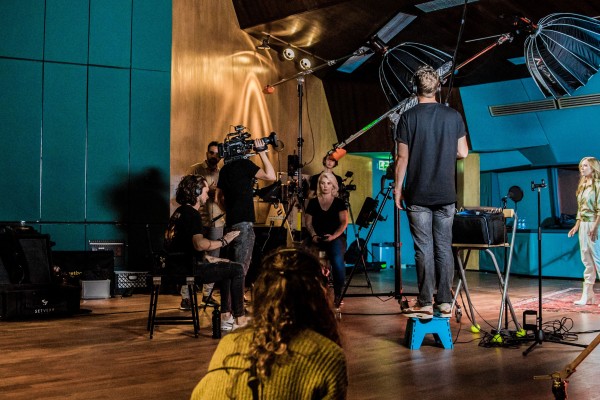
Get inspired!
Read more about projects, research and insights in the media industry.
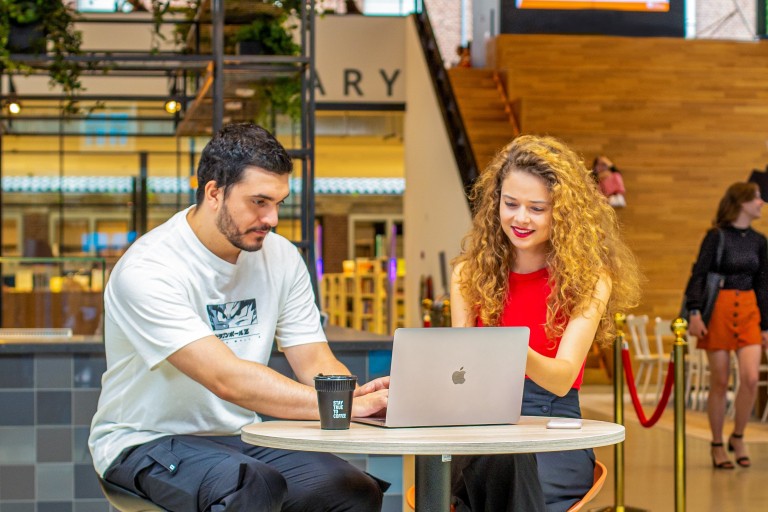
Help with choosing your study programme
Do you want to continue after your bachelor's or further develop your professional skills and are you looking for a master's? Discover, compare and choose your master's programme at BUas.

